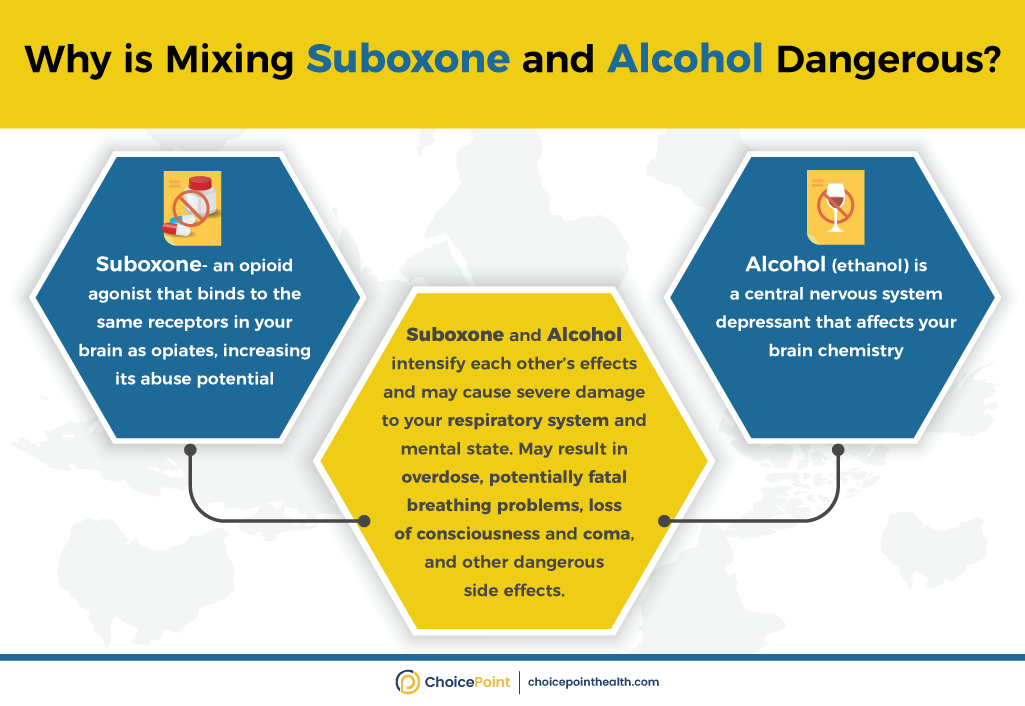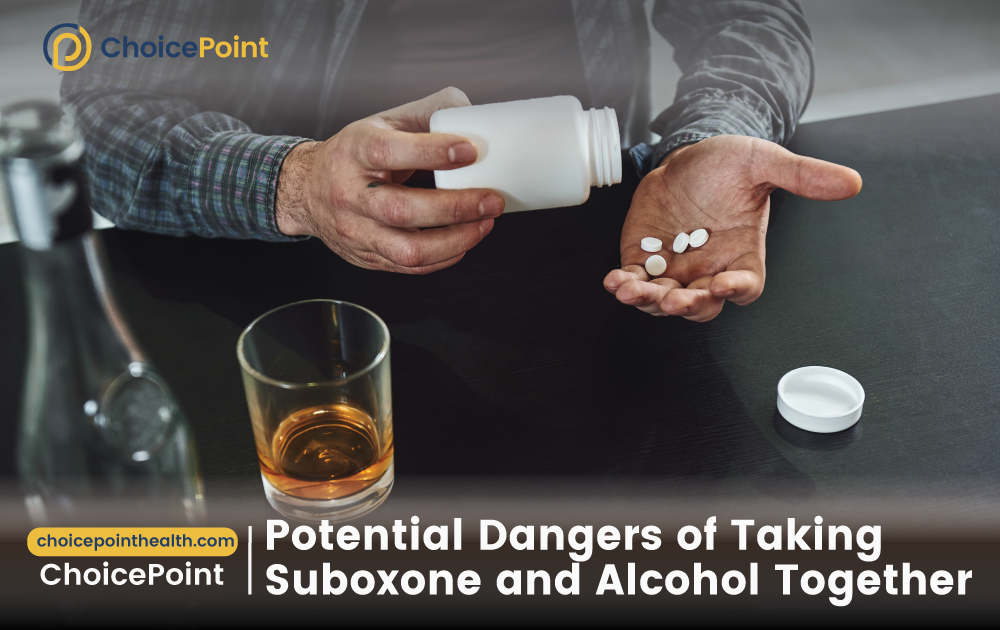Taking Suboxone and alcohol together can be dangerous. Suboxone®, a medication used for opioid dependence, can cause adverse effects on the respiratory and central nervous systems when combined with alcohol. To make informed decisions about your health, it is crucial to understand the potential dangers of taking Suboxone and alcohol together. This blog post will explore five potential risks of combining these substances together.
Table of Contents
Why Is Mixing Alcohol and Suboxone® Dangerous?
Have you ever wondered why taking Suboxone® and alcohol together is so dangerous? Understanding how each chemical impacts your body is critical to understand why combining these two substances is risky. Taking alcohol and Suboxone® may interact negatively and possibly be fatal:
- The opioid agonist Suboxone® (Naloxone® and Buprenorphine) interacts with the same brain receptors as opiates, increasing the risk of abuse.
- Alcohol (ethanol) changes the chemistry of your brain and depresses the central nervous system.
- When Alcohol and Suboxone® are combined, particularly intravenously, Suboxone® and alcohol may have devastating effects on your respiratory system and mental health.
- Other hazardous adverse effects include overdosing, potentially fatal breathing issues, loss of consciousness, and coma.
ChoicePoint is ready to help you overcome addiction and find long-term recovery. Call us today at 844.445.2563 to learn about our addiction treatment programs.
5 Potential Dangers of Taking Suboxone and Alcohol Together
Aside from the common Suboxone® and alcohol side effects, some other risks include:
1. Potential Risk of Overdose
Mixing alcohol and Suboxone® increases the risk of overdose, specifically in people with a history of substance abuse. Taking alcohol and Suboxone® may increase the sedative effects of both substances, making it easier to take too much and overdose accidentally. The soothing effect may slow respiratory and cardiac function, leading to unconsciousness and even death.
2. Reduced Effectiveness of Suboxone®
When alcohol is taken with Suboxone®, it may interfere with how Suboxone® is metabolized in the body. Making it less effective at treating opioid addiction. This may lead to a lack of progress in addiction treatment and increase the relapse risk. When taken together, Suboxone®’s ability to suppress withdrawal symptoms, cravings, and the euphoric effects of opioids may also be compromised.
3. Increased Risk of Liver Damage
Both alcohol and Suboxone® may be toxic to the liver when consumed together.
- The liver plays a crucial role in detoxifying the body from harmful substances.
- Combining alcohol and Suboxone® may put an additional burden on the liver.
- This increased burden may make it harder for the liver to function properly, leading to liver damage or failure.
- Regularly mixing alcohol and Suboxone® increases the risk of liver-related issues, such as hepatitis and cirrhosis.
- Excessive alcohol consumption may also slow the metabolism of Suboxone®’s active ingredient, buprenorphine.
- This may lead to a high level of buprenorphine in the blood, potentially harming the liver.

What Happens When You Mix Suboxone and Alcohol?
4. Increased Risk of Respiratory Depression
Combining Suboxone® and alcohol can have dangerous effects on the respiratory system, resulting in respiratory depression, which can lead to unconsciousness and death if not treated promptly. This risk is even higher for individuals with a history of respiratory problems or COPD. The combination may also cause more severe depression of the respiratory centers in the brainstem, further increasing the risk of respiratory failure and death. It is essential to understand the potential dangers of taking Suboxone® and alcohol together to make informed decisions about their use.
5. Increased Risk of Addiction
Taking alcohol and Suboxone® together may increase the risk of addiction to one or both substances.
- The sedative effects of the combination may create a euphoric feeling that can be addictive.
- Quitting and remaining sober may be challenging when addicted to both substances, as the withdrawal symptoms can be severe and hard to manage.
- Misusing both substances may increase the likelihood of relapse and decrease the chances of a successful recovery.
Do you know you need a team of DEA-certified healthcare professionals who treat drug dependence and learn exactly how to Detox your body from Suboxone and alcohol safely? ChoicePoint is an addiction rehab where our doctors are available 24/7 and perform safe Detox by eliminating the risks of alcohol withdrawal. Contact us now at 844.445.2563.
Is Moderate Drinking While on Suboxone® Safe?
Do not let peer pressure get to you. According to the Centers for Disease Control and Prevention (CDC), no level of alcohol is totally “safe .”This is particularly valid for people using prescription drugs like Suboxone® that have sedative effects. Suboxone® prescription guidelines universally recommend abstaining from alcohol when using the drug. But if you decide to drink a little or a little alcohol while taking Suboxone®, let your doctor know so the two of you may decide what’s best for your health.
Common Side Effects of Mixing Suboxone and Alcohol
Mixing Suboxone® and Alcohol may cause detrimental damage to the human body. It may also lead to a fatal overdose. If you mix Suboxone® and alcohol, side effects may include:
- Impaired or slurred speech
- Dizziness
- Trouble falling asleep or staying asleep
- Loss of consciousness
- Coma
- Potentially fatal breathing problems
- Extreme drowsiness
Is alcohol considered a drug? To understand alcohol and drug addiction, read this comprehensive blog and get the help you need for yourself or someone you love.
Get Help Now from ChoicePoint: Overcoming the Dangers of Mixing Suboxone® and Alcohol
Taking alcohol with Suboxone® may have serious and potentially deadly consequences. More and more people should be informed about the potential risks and dangers of mixing Suboxone and alcohol. ChoicePoint is a co-occurring addiction treatment rehab that provides a Detox Program to help you safely come off of Suboxone and alcohol addiction. We also offer Dual diagnosis addiction treatment programs for those suffering from addiction and mental health disorders.
If a loved one is experiencing substance dependency, ChoicePoint is available to help. Call us at 844.445.2563, and you can schedule an in-person or virtual appointment today!
Medical Disclaimer:
ChoicePoint aims to improve the quality of life for people struggling with substance use disorder and mental health issues. Our team of licensed medical professionals research, edit and review the content before publishing. However, this information is not intended to be a substitute for professional medical advice, diagnosis, or treatment. For medical advice please consult your physicians or ChoicePoint's qualified staff.










Review 5 Potential Dangers of Taking Suboxone and Alcohol Together.